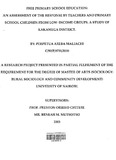| dc.description.abstract | Universal free primary education had been a campaign manifesto of the NARC government, and although Kenyans had been promised this since independence, for many, this they thought, was a mere vote-catching statement as had been the case when previous governments used it to win support. When the government launched the programme with a bang, many Kenyans were still doubting Thomases and unprepared for it. Public response in order to gain from the pronouncement was overwhelming and class enrollment swelled beyond existing facilities. While the teachers having been demotivated by the previous government's failure to implement their terms of service were despondent. Almost a year since the programme was realized some communities are still
evidently ambivalent about its success. Schools having received children some of them who were neither adults nor children, others with scanty literary having dropped out previously due to the demand for levies by schools had not coped up fully with the situation .The parents misconceived free education to include free uniform, shoes and even lunches for their children. Where's community development encourages participation on the part of the communities, politicians have misused the essence of the program to label teachers who encourage parents to fully participate and own the programme as being anti Government. The teachers have as a result become afraid and accommodated the situation with latent grudge. Many schools still conduct classes in abandoned buildings and tree shades while logs are used in place of desks. The funds provided by the government are for specific items and do not cover construction and expansion of physical facilities.In many cases these funds delay in reaching schools so that the need for parents and community participation is still called for.
The study has brought out the effects of free education on enrollment, performance, teachers' efficiency and the general attitude of the parents, towards free education.
The observations made were collected through contacts with parents, pupils, teachers and members of the community. The area in forecast is Ikolomani Division of Kakamega District which, although densely populated, suffers from low in come and low school participation.
The information given here is not exhaustive but it is an attempt to highlight the level of participation and response by the stakeholders as beneficiaries in the government efforts to eradicate ignorance.
The plan to introduce free primary education was noble and timely especially as an attempt to fight ignorance and poverty. It would have been, however, prudent for the government to fully prepare the stake holders to own and appreciate it in order to ensure their full understanding. This would have
assisted in removing the current residual doubts by some stakeholders about its
success. As stated in this report although brief, is quite telling and further research may
reveal the situation observed here being evident in other areas of the country. Education planners and implementers of the programme will hopefully find this information valuable for innovative adjustments within the programme for better results. | en |

